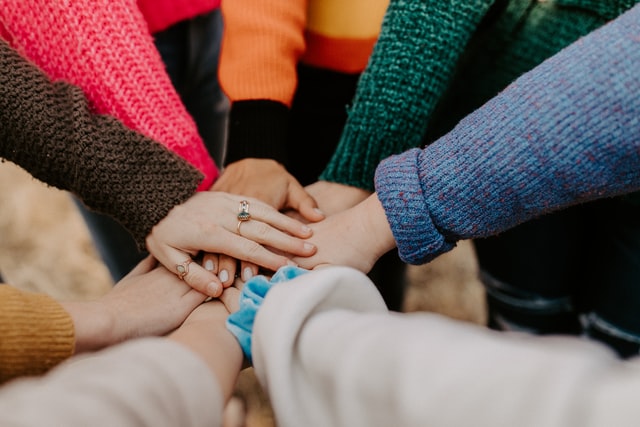The steering committee of the Asian Pacific Islander ERG acknowledges that the unrest, instability, and uncertainty in Afghanistan is causing suffering among the Afghan people. In addition to the rapidly changing political situation and warlike conditions, Afghanistan has experienced earthquakes and is facing a food shortage as winter approaches.
 The situation in-country causes a ripple effect that has implications for those around the world, including the local Afghan-American community, which is one of the largest in the country. We stand in solidarity with the Afghan people, both here and abroad. Whether people are feeling distress about the situation in Afghanistan and the plight of family members, or are experiencing discrimination and concern about their own safety here at home, there are resources available and ways in which we can give support.
The situation in-country causes a ripple effect that has implications for those around the world, including the local Afghan-American community, which is one of the largest in the country. We stand in solidarity with the Afghan people, both here and abroad. Whether people are feeling distress about the situation in Afghanistan and the plight of family members, or are experiencing discrimination and concern about their own safety here at home, there are resources available and ways in which we can give support.
What You Can Do:
Lab Resources:
- Employee Assistance Plan (EAP): helps employees and their family members find solutions to personal and work-related challenges through counseling, consultation, assessment, and referrals. All services are voluntary, confidential, and free of charge.
- UC’s medical coverage includes behavioral health benefits for mental health services and substance abuse treatment. Contact your health care provider to explore your mental health benefits and to speak to someone about finding support.
- UC Mental Health Benefits for Postdocs
- UC Behavioral Health Benefits (Kaiser, Healthnet, Anthem etc.)
- Healthy & Well at LBNL – Healthy & Well at LBNL is a centralized location for Lab staff to find support and resources to help build their health, wellness and well-being. The website is intended to get you thinking about the things you can do to foster health and wellness in your life – both at work and at home. In each section you’ll find a collection of resources from the Lab, UC Berkeley and the community that touch on different aspects of health and wellness.
Donate to:
- Afghanistan Emergency Response: UC Berkeley’s Human Rights Center, in partnership with San Jose State’s Human Rights Institute and the UC Berkeley Afghan Student Association, has created the Afghanistan “Scholars at Risk Fund” on behalf of our campuses to respond to the Taliban takeover in Afghanistan and the urgent need to help journalists, lawyers, and other academics—especially women to enable emergency travel and placement in the Bay Area.
- UNICEF USA: Nearly 600,000 children and families are faced with displacement and insecurity in Afghanistan. UNICEF is working with partners to ensure that internally displaced families have access to urgently needed humanitarian assistance including safe water, sanitation facilities, basic health and nutrition services, psychosocial support, and temporary learning spaces.
- International Rescue Committee: The International Rescue Committee, which operates branches in Oakland as well as internationally, has launched a $10 million appeal to raise funds for the emergency response to ensure aid can still be provided within Afghanistan, as well as to continue to provide support and protection for internally displaced people in Kabul.
- The AJSC (Afghan Journalists Safety Committee) provides shelters, safe houses and other support for journalists and their families.
- United Afghan Association is hosting collection drives for clothing, toiletries, housewares and food with drop-off locations in the East Bay.
- Jewish Family Community Services East Bay has also created a wish list of household items to help new arrivals move from trauma to comfort.
Take Action:
- The Afghan Coalition, located in Fremont, CA has been providing domestic violence classes, and various services for the immigrant and refugee population. Services through the TEAM and CHANGES program have served many individuals and families by listening to their needs and providing to them and connecting them with appropriate services.
- Family Link – American Red Cross is helping to locate loved ones who have been impacted by the current events in Afghanistan, through our Restoring Family Links program. To learn more, visit the Restoring Family Links website. Additional mental health support is also available, and we encourage people to reach out to the free 24/7 Disaster Distress Helpline via phone or text (1-800-985-5990).
Veteran Resources:
These resources are provided to help veterans who may be going through a crisis as a result of their time in service to our country.
- The Veterans Crisis Line: Connects veterans in crisis and their families and friends with qualified, caring Department of Veterans Affairs responders through a confidential toll-free hotline, online chat, or text.
- AboutFace – A Program of the National Center for PTSD – On AboutFace, you can learn about PTSD and treatment from people who have been there. In the videos on this site, you can hear real stories from Veterans and their family members, and get advice from VA clinicians who have treated thousands of Veterans with PTSD.
- The National Center for PTSD is dedicated to research and education on trauma and PTSD. They work to assure that the latest research findings help those exposed to trauma.
- PTSD Programs list for California – All VA Medical Centers offer PTSD treatment, even if there is no specific PTSD program. Contact your local VA Medical Center and ask for the Mental Health clinic. Many Vet Centers and VA Community Based Outpatient Clinics also offer PTSD treatment.
Photo by Hannah Busing on Unsplash
